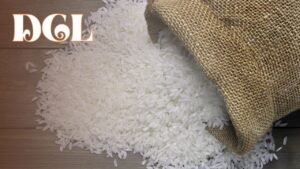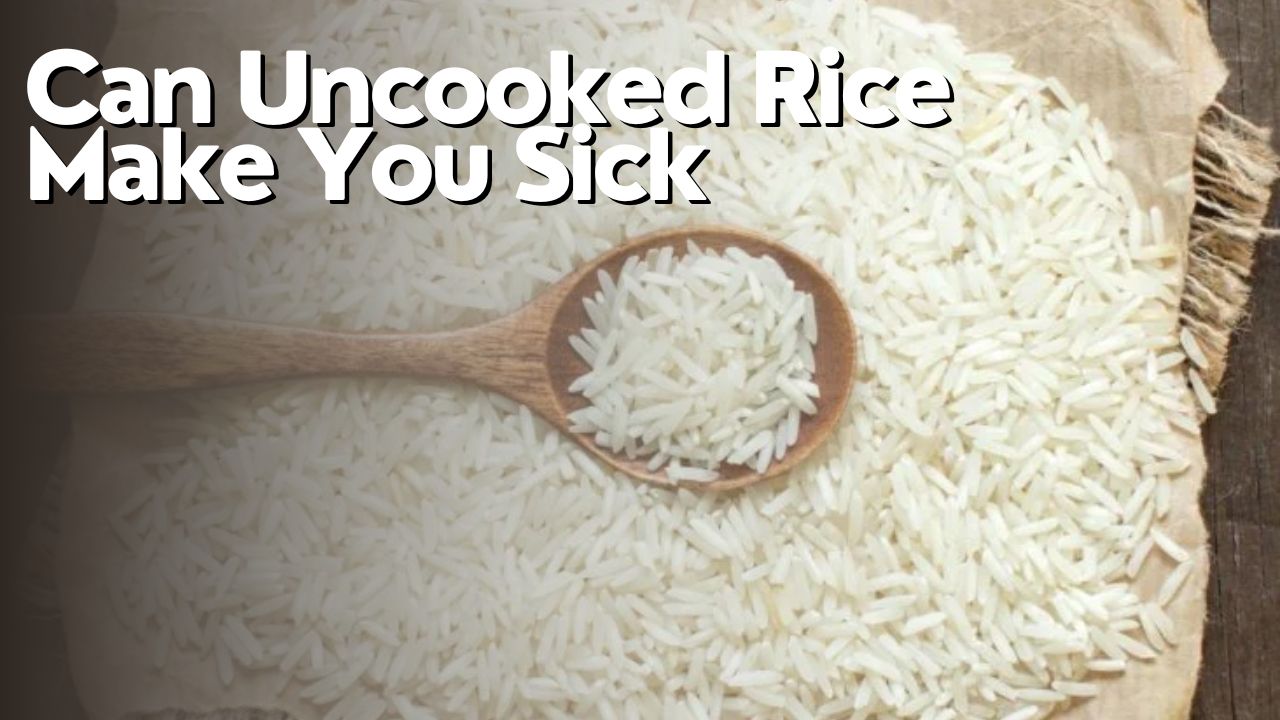Hey there! Have you ever wondered if uncooked rice can make you sick? Well, I’m here to shed some light on this common misconception.
The truth is, there’s a myth floating around that uncooked rice can be harmful to your health. But let me tell you, that’s simply not the case. Uncooked rice itself is not inherently dangerous or toxic. In fact, rice is a staple food for many people around the world.
The key to rice safety lies in the cooking process. Cooking rice properly ensures that any harmful bacteria or microorganisms present in the raw grains are killed off, making it safe to eat. So, it’s not the uncooked rice that poses a risk, but rather the potential for contamination during storage or improper cooking.
In this article, we’ll explore the truth about uncooked rice, the role of cooking in rice safety, common symptoms and risks, and ultimately, how to make informed choices when it comes to consuming this beloved grain.
So, let’s dive in and debunk this myth once and for all!
The Myth of Uncooked Rice Dangers
Don’t believe the hype – uncooked rice won’t give you a stomachache, it’s as harmless as a fluffy cloud floating in the sky. Many people have heard the myth that uncooked rice can make you sick, but let me set the record straight once and for all.
The idea that uncooked rice is dangerous stems from the belief that it can expand in your stomach and cause discomfort. However, this is simply not true. Rice grains are hard and dry, and they need to be cooked in order to become soft and edible.
In fact, eating uncooked rice is no different than eating any other type of raw grain, such as wheat or oats. It may not taste great, but it won’t make you sick.
So next time you see a recipe calling for uncooked rice, don’t be afraid to give it a try. You’ll find that it’s perfectly safe and won’t cause any harm to your stomach.

The Truth About Uncooked Rice
When it comes to uncooked rice, there is more to it than just the potential risks of bacterial contamination.
Uncooked rice actually has some nutritional value, containing essential minerals and vitamins.
However, it is important to be aware of the risks of bacterial contamination and practice proper handling and cooking techniques to ensure its safety for consumption.
Nutritional Value of Uncooked Rice
You’ll be surprised by the nutritional benefits of uncooked rice! Many people view uncooked rice as plain and tasteless, but it actually contains several essential nutrients that contribute to a healthy diet.
Here are four important nutritional components found in uncooked rice:
- Fiber: Uncooked rice is a great source of dietary fiber. Fiber aids in digestion and helps maintain a healthy weight.
- Vitamins: Uncooked rice contains various B vitamins, such as thiamin, niacin, and vitamin B6. These vitamins play crucial roles in energy production and brain function.
- Minerals: Uncooked rice is rich in minerals like magnesium, phosphorus, and selenium. These minerals are essential for strong bones, proper nerve function, and a healthy immune system.
- Antioxidants: Uncooked rice contains antioxidants that help protect the body against free radicals. This reduces the risk of chronic diseases like heart disease and cancer.
So, next time you think uncooked rice is devoid of nutrition, think again!
Risks of Bacterial Contamination
Bacterial contamination poses risks if proper food safety practices are not followed. Uncooked rice, like any other raw food, can potentially harbor harmful bacteria such as Salmonella or Bacillus cereus. These bacteria can cause food poisoning if ingested.
The main concern with uncooked rice is the presence of spores of Bacillus cereus. These spores can survive the cooking process and multiply if the rice is not stored or handled properly. This can lead to the production of toxins that can make you sick.
To minimize the risk of bacterial contamination, it is important to store uncooked rice in a cool and dry place, separate from other raw foods. Additionally, wash your hands thoroughly before handling rice and cook it properly to kill any bacteria or spores that may be present.
Proper Handling and Cooking Techniques
To ensure safe consumption, it’s crucial to handle and cook rice properly, using techniques that guarantee the elimination of harmful bacteria and the creation of a delicious meal.
First, always wash the rice thoroughly before cooking to remove any dirt or impurities.
Next, use the right amount of water to cook the rice, following the package instructions or using a rice cooker for precise measurements. It’s important to bring the water and rice to a boil, then reduce the heat to a simmer and cover the pot tightly. Let the rice cook for the recommended time or until all the water is absorbed.
Finally, after cooking, refrigerate any leftover rice promptly to prevent bacterial growth.
By following these proper handling and cooking techniques, you can enjoy safe and tasty rice dishes without worrying about getting sick.
The Role of Cooking in Rice Safety
Cooking plays a crucial role in ensuring the safety of rice consumption. When it comes to uncooked rice, proper cooking techniques are necessary to eliminate any potential health risks. Here are four reasons why cooking is essential for rice safety:
- Temperature: Cooking rice at high temperatures kills harmful bacteria like Bacillus cereus, which can cause food poisoning. Heating rice to at least 165°F (74°C) ensures that any bacteria present are destroyed.
- Hydration: Cooking rice involves adding water, which hydrates the grains and helps eliminate any toxins that might be present. Proper hydration also ensures that the rice is cooked evenly and thoroughly.
- Digestibility: Cooking rice breaks down complex carbohydrates, making it easier for our bodies to digest and absorb the nutrients. This improves the overall nutritional value and minimizes the risk of gastrointestinal discomfort.
- Texture: Properly cooked rice has a soft and fluffy texture that is pleasing to eat. It should not be too hard or too mushy. Cooking rice correctly ensures that it reaches the perfect texture, making it more enjoyable to consume.
By following proper cooking techniques, we can ensure that uncooked rice is transformed into a safe and delicious meal. So, next time you cook rice, remember the importance of cooking it thoroughly to protect your health.
Common Symptoms and Risks
When it comes to the common symptoms and risks of food poisoning from uncooked rice, I’ve experienced firsthand the stomach cramps, nausea, and vomiting that can occur.
Additionally, some individuals may have allergic reactions to rice, such as hives or difficulty breathing.
For those with digestive issues, uncooked rice can be particularly problematic, leading to bloating, gas, and diarrhea.
It’s important for vulnerable individuals, such as pregnant women, young children, and the elderly, to take extra precautions when handling and consuming uncooked rice to avoid any potential health risks.

Food Poisoning from Uncooked Rice
Eating uncooked rice can actually make you sick! It may come as a surprise, but uncooked rice can harbor harmful bacteria that can cause food poisoning. Here are four reasons why uncooked rice can be dangerous:
- Bacterial growth: Uncooked rice contains spores of Bacillus cereus, a type of bacteria that can survive the cooking process. When rice is left at room temperature, these spores can multiply and produce toxins that can make you ill.
- Diarrhea and vomiting: Consuming uncooked rice contaminated with Bacillus cereus can lead to symptoms like diarrhea, vomiting, and abdominal cramps. These symptoms can start within a few hours of ingestion and can last for up to 24 hours.
- Cross-contamination: Uncooked rice can easily contaminate other food items or surfaces in your kitchen if proper hygiene measures are not taken. This can increase the risk of foodborne illnesses.
- Proper cooking is essential: Cooking rice thoroughly kills any bacteria present in the grains, making it safe to eat. It is important to follow cooking instructions and ensure that rice is cooked to a safe temperature of 165°F (74°C) to eliminate any potential health risks.
To avoid the risk of food poisoning, it is best to cook rice properly before consuming it.
Allergic Reactions and Digestive Issues
To avoid potential allergic reactions and digestive issues, it’s important to be aware of the risks associated with consuming improperly prepared rice.
While uncooked rice itself is not likely to cause food poisoning, it can still pose a health risk for some individuals. For those with a rice allergy, even a small amount of uncooked rice can trigger an allergic reaction, ranging from mild symptoms like itching and hives to more severe reactions like difficulty breathing or anaphylaxis.
Additionally, uncooked rice contains a naturally occurring enzyme called phytate, which can interfere with the absorption of essential minerals in the body. This can lead to digestive issues such as bloating, gas, and nutrient deficiencies.
Therefore, it’s crucial to always cook rice thoroughly and follow proper food safety guidelines to minimize the risk of these health issues.
Precautions for Vulnerable Individuals
After learning about the potential allergic reactions and digestive issues related to uncooked rice, it’s important to discuss the precautions that vulnerable individuals should take.
As someone who has experienced digestive issues in the past, I understand the importance of being cautious. If you have a weakened immune system or any underlying health conditions, it is crucial to handle uncooked rice with care.
One precaution is to thoroughly wash the rice before cooking it, as this can help remove any potential contaminants. Additionally, it is recommended to cook the rice at a high temperature to ensure that any harmful bacteria or toxins are killed.
Lastly, storing uncooked rice in a cool and dry place is essential to prevent the growth of bacteria or mold.
By following these precautions, vulnerable individuals can minimize the risk of getting sick from uncooked rice.
Conclusion: Making Informed Choices
When it comes to making informed choices, you should always remember that uncooked rice has the potential to make you sick. It is important to take precautions and handle uncooked rice properly to avoid any health risks. As a vulnerable individual, I understand the importance of being cautious and ensuring my safety. Here are a few key points to keep in mind:
- Always wash your hands thoroughly before and after handling uncooked rice. This simple step can help prevent the spread of bacteria and other harmful contaminants.
- Store uncooked rice in a cool and dry place to avoid the growth of mold or bacteria. Moisture can create an ideal environment for these microorganisms to thrive.
- Cook rice thoroughly to kill any potential bacteria or toxins. Undercooked rice can contain spores of bacteria that can cause food poisoning.
- Avoid leaving cooked rice at room temperature for extended periods. Bacteria can multiply rapidly in warm conditions, so it’s best to refrigerate any leftover cooked rice within two hours.
By following these precautions, you can reduce the risk of getting sick from uncooked rice. Stay informed, stay safe, and make wise choices when it comes to your health.
Frequently Asked Questions
How long does it take for uncooked rice to go bad?
Uncooked rice can last indefinitely if stored properly in a cool, dry place. However, it may lose its quality over time, becoming stale or infested with bugs. It is important to check for any signs of spoilage before consuming.
Can uncooked rice cause food poisoning?
Uncooked rice can cause food poisoning if it is contaminated with harmful bacteria like Bacillus cereus. These bacteria can multiply and produce toxins that, when ingested, can lead to symptoms like nausea, vomiting, and diarrhea.
Is it safe to eat uncooked rice if it has been properly stored?
It is generally safe to eat uncooked rice if it has been properly stored. However, it is always recommended to cook rice thoroughly to ensure any potential bacterial contamination is eliminated and to avoid any potential risks.
What are the potential risks of consuming uncooked rice?
Potential risks of consuming uncooked rice include food poisoning from bacteria like Bacillus cereus, which can cause vomiting and diarrhea. Proper cooking kills these bacteria, so it’s best to cook rice thoroughly to avoid getting sick.
Are there any health benefits to eating uncooked rice?
There are no health benefits to eating uncooked rice. It is not safe to consume as it may contain harmful bacteria that can cause food poisoning.
Conclusion
In conclusion, I’ve learned that the myth about uncooked rice making you sick is just that – a myth. Uncooked rice is not inherently dangerous, as long as you handle it properly and cook it thoroughly.
While there are potential risks associated with eating undercooked rice, such as food poisoning, these risks can be eliminated by following proper cooking instructions.
So, next time you’re in the kitchen, don’t worry about uncooked rice making you sick. Cook it well and enjoy your meal without any concerns.


